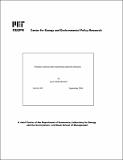| dc.contributor.author | Montero, Juan-Pablo | en_US |
| dc.contributor.other | Massachusetts Institute of Technology. Center for Energy and Environmental Policy Research. | en_US |
| dc.date.accessioned | 2009-04-03T17:06:14Z | |
| dc.date.available | 2009-04-03T17:06:14Z | |
| dc.date.issued | 2004 | en_US |
| dc.identifier | 2004-014 | en_US |
| dc.identifier.uri | http://hdl.handle.net/1721.1/45022 | |
| dc.description.abstract | I study the advantages of pollution permit markets over traditional standard regulations when the regulator has incomplete information on firms₂ emissions and costs of production and abatement (e.g., air pollution in large cities). Because the regulator only observes each firm₂s abatement technology but neither its emissions nor its output, there are cases in which standards can lead to lower emissions and, hence, welfare dominate permits. If permits are optimally combined with standards, in many cases this hybrid policy converges to the permits-alone policy but (almost) never to the standards-alone policy. | en_US |
| dc.format.extent | 32 p | en_US |
| dc.publisher | MIT Center for Energy and Environmental Policy Research | en_US |
| dc.relation.ispartofseries | MIT-CEEPR (Series) ; 04-014WP. | en_US |
| dc.title | Pollution markets with imperfectly observed emissions | en_US |
| dc.type | Working Paper | en_US |
| dc.identifier.oclc | 57676986 | en_US |
